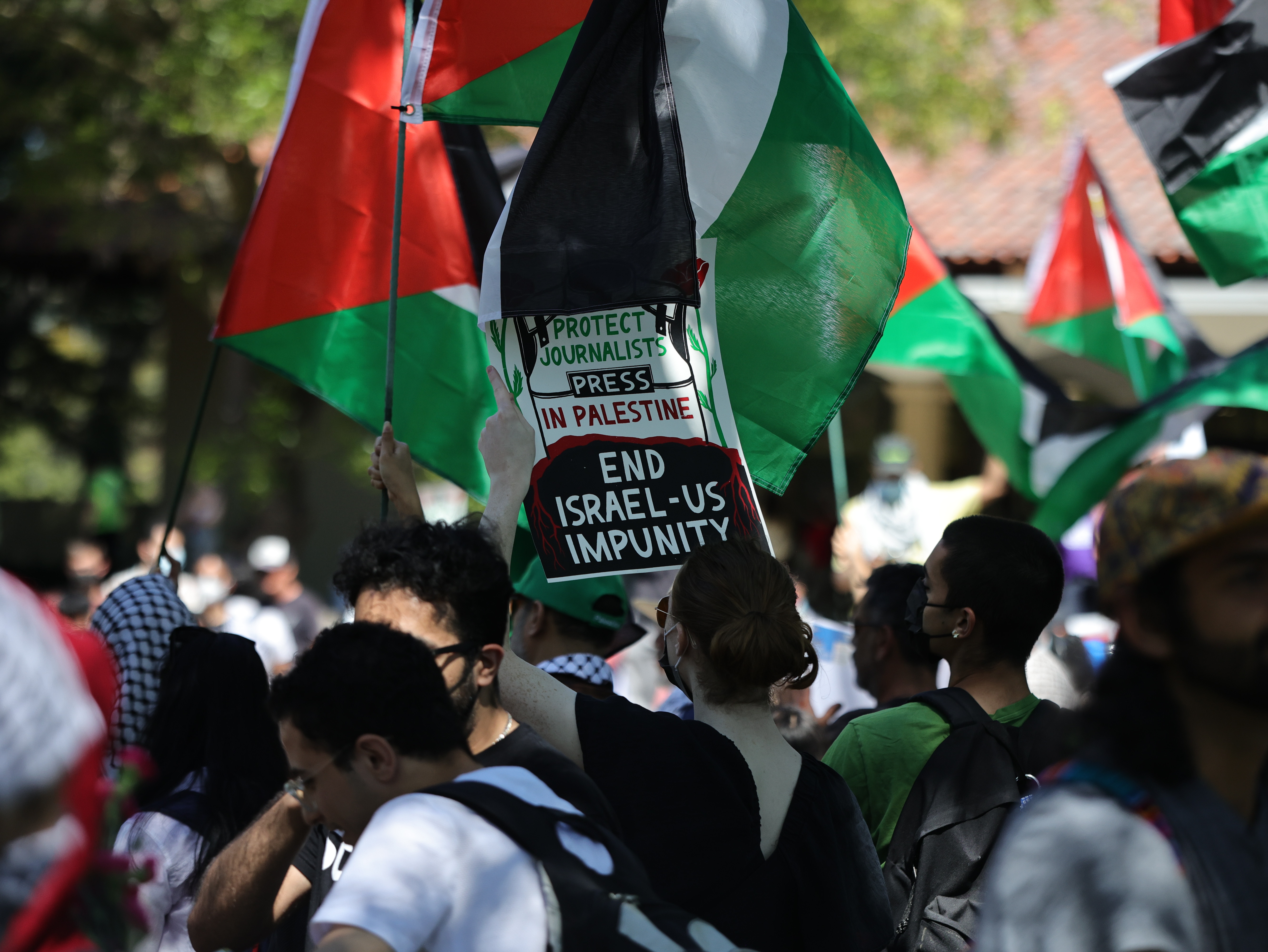Around 100 students and community members marched from Memorial Church to the Stanford University Department of Public Safety (SUDPS) Wednesday afternoon to protest Israel’s bombing of Rafah. Demonstrators also demanded that the University drop charges against an unidentified student who was allegedly arrested and banned from campus last week for policy violations related to pro-Palestine advocacy.
On Tuesday, Israeli airstrikes and shelling killed at least 37 people sheltering in Rafah, a Palestinian city in the southern Gaza strip. The city has grown in population from 250,000 to 1.4 million since the start of the Israel-Gaza war, as Palestinians have fled from other parts of Gaza.
The International Court of Justice ordered Israel to halt the offensive on Rafah last week. But the Israeli government maintains its military operation in Rafah is necessary to eliminate Hamas targets and free hostages taken during the Oct. 7 attack.
Reza Yazan, a Palestinian American whose spouse is a Stanford student, called the recent attack on Rafah “gut-wrenching.” Yazan, who brought his daughter to watch the rally, said that especially as a father, seeing children killed and burned was “just devastating.”

Community members expressed support for students involved with the pro-Palestine encampment. Stanford started to process disciplinary referrals this month against student organizers at the encampment, which violates the University’s time limits on demonstrations in White Plaza.
Pro-Palestine students have circulated a petition this week to ask University President Richard Saller and Provost Jenny Martinez to allow a student banned from campus to return. The petition has garnered over 560 signatures as of May 29. According to an Instagram post from Stanford Against Apartheid in Palestine (SAAP), the student was given no time to collect her belongings from campus, where she lives, studies and works.
“They are deciding to instead suspend students, ban students from campus and suppress them rather than pushing for divestment, and rather than pushing for disaffiliation as well as disclosure,” a spokesperson for The People’s University, the encampment set up in White Plaza since April 25, told The Daily. The spokesperson requested anonymity due to fear of professional retaliation.
Carlos Enrique Ramirez ’26, who attended the Wednesday demonstration, said the University’s focus on punishing students for protesting “one of the most horrific massacres that we’ve seen” rather than “actually doing anything about it” was “so, so disgusting.”
Similarly, Yazan criticized the University’s “blind eye” to the humanitarian crisis in Rafah and other human rights violations amid the ongoing Israel-Gaza war.
“The longer it goes, the more disappointing the silence and inaction the University is showing,” Yazan said. “It’s reflective of broader silence within this country, which the government is leading by example.”
Ramirez said that he was approached by an SUDPS officer at the rally, an interaction Ramirez believes was an effort to threaten him.
“They’re trying to use police officers to intimidate us. We’re completely unafraid,” Ramirez said.
The officer was also raised in the petition as someone who made offensive remarks about the arrested student’s physical appearance.
Also at the demonstration were around six members of the Raging Grannies, an international activist coalition of older women whose local chapter often attends regional protests.

“I’ve been in this struggle for 64, 65 years,” said Iza Predmore, a member of the Raging Grannies, of her pro-Palestine advocacy.
“We were part of the Vietnam War protests when we were in college,” said Lotus Yee Fong, a Stanford parent who is also part of the Raging Grannies. “It’s time to end the colonial period.”
“We are proud of these students standing up for what is morally right,” Fong said. “Because that is the role of the youth.”
In a speech before Memorial Church, Palestinian student Yousef AbuHashem ’25 pleaded with administrators to think of human rights and to consider the people in Rafah as “colleagues, sons, daughters, mentors, professors, neighbors, kids, nieces and nephews.”
”Think about why we’re protesting and what we’re protesting for,” AbuHashem said. “You’re a human and I’m a human too. You’re not just an administrator trying to broker a deal with me. I hope you understand this.”
It is unclear whether SAAP plans to hold protests during Commencement and through the end of the quarter. “This is still a really crucial time for us to push for our goals and push for our demands,” the spokesperson said. “The more that Stanford represses students, the more ideologically emboldened the students are.”
